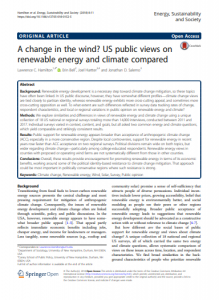Full Title: A change in the wind? US public views on renewable energy and climate compared
Author(s): Lawrence C. Hamilton, Erin Bell, Joel Hartter, Jonathan D. Salerno
Publisher(s): Springer Nature
Publication Date: April 1, 2018
Full Text: Download Resource
Description (excerpt):
Background
Renewable energy development is a necessary step toward climate change mitigation, so these topics have often been linked. In US public discourse, however, they have somewhat different profiles—climate change views are tied closely to partisan identity, whereas renewable energy exhibits more cross-cutting appeal, and sometimes more cross-cutting opposition as well. To what extent are such differences reflected in survey data tracking rates of change, respondent characteristics, and local or regional variations in public opinion on renewable energy and climate?
Methods
We explore similarities and differences in views of renewable energy and climate change using a unique collection of 18 US national or regional surveys totaling more than 14,000 interviews, conducted between 2011 and 2017. Individual surveys varied in context, content, and goals, but all asked two common energy and climate questions, which yield comparable and strikingly consistent results.
Results
Public support for renewable energy appears broader than acceptance of anthropogenic climate change (ACC), especially in a more conservative region. Despite local controversies, support for renewable energy in recent years rose faster than ACC acceptance on two regional surveys. Political divisions remain wide on both topics, but wider regarding climate change—particularly among college-educated respondents. Renewable energy views in counties with proposed or operating wind farms are not systematically different from those in other counties.
Conclusions
Overall, these results provide encouragement for promoting renewable energy in terms of its economic benefits, working around some of the political identity-based resistance to climate change mitigation. That approach could be most important in politically conservative regions where such resistance is strong.
